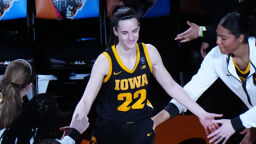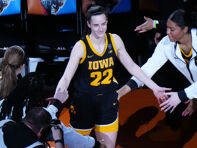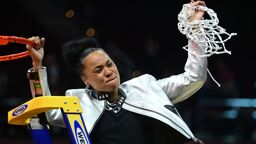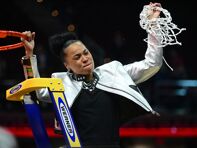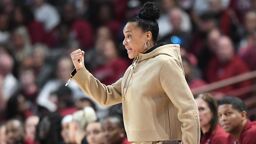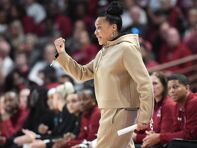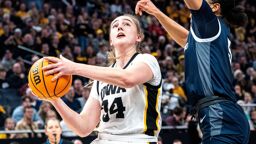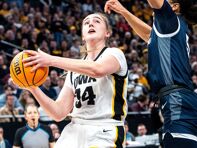 Must Reads
Must Reads 
The National Association of Basketball Coaches has formally included "sexual orientation" as a protected group in their anti-discrimination and anti-bullying policies. The NABC is the nation's largest network of men's high school and college basketball coaches.
One part of the NABC's statement on the policies really jumped out at me:
The NABC opposes any action or inaction that has a tendency to cause or is intended to cause emotional or physical harm, an unequal or disproportionate effect, or unreasonable requirement because of any particular trait.
"Action or inaction." That holds coaches responsible for not taking proactive steps to stop discrimination or harassment on their teams. "I didn't know" isn't enough for the NABC, and that's a great step in the right direction.
With more and more gay men coming out in basketball, the inclusion of their protection was an increasingly important step.
"To have the NABC put out such a powerful statement on inclusion shows the importance of the issue," said Anthony Nicodemo, head basketball coach at Saunders High School in New York, where he came out publicly last year. Nicodemo had been in contact with the NABC about implementing a more inclusive policy.
"I have been a member for over 15 years and the organization was so supportive with the concerns. So many coaches will receive the statement and I hop it continues to promote a change in athletics overall. It really makes me proud to be a member."
Bob Walsh, the new head men's basketball coach at the University of Maine, said there's some real education that needs to happen across men's team sports.
"It's something there is a lack of education about in general, when it comes to team sports, male team sports at the college level," Walsh said. "So I think the statement is a terrific step.
"A lack of education and understand is something that has been noticeable to me. Guys are generally unaware of maybe some hurtful comments or phrases that they use that they might consider mainstream. People are aware of something that's racially offensive, but they're less aware of how it effects [people who are gay]."
Walsh said he addresses the issue on a regular basis with his team. He said he hears the word "faggot" regularly around basketball, and that he addresses it every time he hears it.
"It's an accepted insult that's considered funny by some people," he said. "I hear it a lot in team settings with males, and I immediately address it. I help them understand the connotation and the hurt in that word. I think that's where you start the conversation."
Hopefully the policy will mean more coaches take proactive steps like Walsh is doing at Maine.
If there's one criticism of the policy, it's the lack of inclusion of gender identity and expression. Hopefully that can be included in the policy's next iteration.
Here is the full statement from the National Association of Basketball Coaches:
Since its beginning, the National Association of Basketball Coaches (NABC) has continually worked to further the best interests of the game of basketball and the players and coaches who participate in the sport. The NABC has long recognized the importance of diversity in basketball and is committed to creating an inclusive environment for all participants of the game.
The NABC opposes all forms of discrimination against any individual on the basis of race, color, national origin, ethnicity, sex, disability, sexual orientation or religion. There is no room for such actions in the sport of men's basketball.
Moreover, the NABC opposes all forms of harassment and bullying. Although our member coaches always seek to instill high moral and ethical values in all participants of the game, the NABC recognizes that bias still exists in our country and that bullying finds its way into sports too often.
The NABC's stance against bullying goes beyond treating someone less favorably because of his or her race, color, national origin, ethnicity, sex, disability, sexual orientation or religion. The NABC opposes any action or inaction that has a tendency to cause or is intended to cause emotional or physical harm, an unequal or disproportionate effect, or unreasonable requirement because of any particular trait. Further, the NABC opposes any behavior toward players that is offensive, abusive, belittling, intimidating or threatening.
We encourage anyone who feels that they have been bullied to reach out to his or her coach or an athletic administrator so that he or she may take appropriate action. Additionally, most schools where our members coach have comprehensive anti-bullying policies and procedures, and we encourage anyone who feels that he or she has been a target of bullying to utilize these procedures. Our member coaches are always there to assist players who feel that they have been the targets of bullying.







